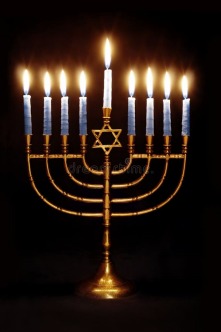This resource gives a space for learners to navigate their Jewish identity in a climate of antisemitism, and particularly in light of new realities after the horrific attacks by Hamas on Israel on October 7. Using the symbol of the menorah, the resource invites learners to think about ways they express their Jewish pride. It prompts them to consider how acts of overt antisemitism, like the many we’re experiencing today, may shift how much we reveal or hide about ourselves. It ends with an opportunity to make commitments towards expressing Jewish pride in unique and individualized ways.
On October 8th, the day after the horrific Hamas attack on Israeli civilians, U2 and Bono opened their performance at The Sphere in Las Vegas with a special version of their song Pride (In The Name Of Love) dedicated to the Israeli lives lost at the music festival.
Let's have a listen.
| Scan the QR code or click here to watch “They could not take our pride” video together. |  |
Facilitator prompts the group:
If in person, share your answers together as a group.
If online, put your answers in the chat box, or on a shared document.
Facilitator reads for framing:
Each and every day we make decisions about how to show up in the public sphere. Sometimes, we may be confident with a decision about public displays of our Jewish identities. Acts of overt antisemitism may shift how much we reveal or hide about ourselves, with the stakes feeling even higher about making choices about which parts of our Jewish pride we want to be on display for others to see.
Facilitator prompts the group:

Facilitator asks a few people to share out their responses, representing different points on the spectrum.
| Facilitator reads, frames and prompts:
To deepen our exploration, we’re going to explore a powerful Jewish symbol: the Chanukah menorah. Spend a moment and list your associations with the Chanukah menorah.
|
 |
Facilitator note:
Depending on context and timing, you may want to add what was not surfaced in the conversation: The miraculous nature of the Maccabees victory, light in the darkness, the fact that many Jews can identify it – it’s a well-known symbol of Judaism, etc.
Let’s continue our use of the Menorah as a symbol by analyzing the following Rabbinic text:
Facilitator reads or has a volunteer read:
The Talmud (Shabbat 21b) states,
תָּנוּ רַבָנַן: נֵר חֲנוּכָּה מִצְוָה לְהָנִיחַ עַל פֶּתַח בֵּיתו מִבַּחוּץ. אִם הָיָה דָּר בַּעֲלִיָיה — מַנִיחָה בַּחַלּוֹן הַסְּמוּכָה לִרְשׁוּת הָרַבִּים. וּבִשְׁעַת הַסַּכָּנָה — מַנִיחָה עַל שֻׁלְחָנו ודַיּוֹ
The Sages taught in a Baraita [a Jewish legal text supplementing the core Mishnaic text]:
It is a mitzvah to place the Hanukkah lamp [menorah] at the entrance to one’s house on the outside, so that all can see it. If one lives upstairs, one should place it at the window adjacent to the public domain. And in a time of danger, one places it on the table and that is sufficient to fulfill the mitzvah.
Facilitator prompts the group:
Discuss as a group and compare responses.
Facilitator explains and prompts:
| Scan the QR code or use the gallery of images at this link. |  |
Facilitator creates breakout groups for learners to share their responses with one another. (10 minutes)
Facilitator reads for framing:
On the Shabbat after the attack, Rabbi Rachel Timoner, an American Rabbi based in Brooklyn NY, encouraged congregants to remember their parts in the Jewish and Israeli story:
“But please, please do not take your mezuzah off your door. Please do not stop coming here to be together. Please do not take your star from around your neck. Please do not stop living as proud Jews. Please do not stop standing as steadfast supporters of our Israeli family, who feel more alone in the world now than ever. Please do not stop calling for the return of the hostages. Please do not stop giving to aid funds. Please do not stop calling Israeli friends and family, here and there. Please do not stop doing all of the Jewish things you do. Every one of them, every Jewish thing you do, matters.”
Facilitator prompts the group:
This conversation gave the opportunity to think more carefully about how and when we express our Jewish pride, particularly in moments when global Jewry is in crisis and facing increased antisemitism. Drawing on the imagery of the menorah, it gave a chance to assess our own revealing and concealing of symbols and markers of Jewish pride and identity, prompting us to always be aspirational.
Facilitator prompts the group:
![]()
This conversation gave the opportunity to think more carefully about how and when we express our Jewish pride, particularly in moments when global Jewry is in crisis and facing increased antisemitism. Drawing on the imagery of the menorah, it gave a chance to assess our own revealing and concealing of symbols and markers of Jewish pride and identity, prompting us to always be aspirational.
Facilitator prompts the group:
![]()
Pop Up that come after 2 clicks on page just for one time in coockes session